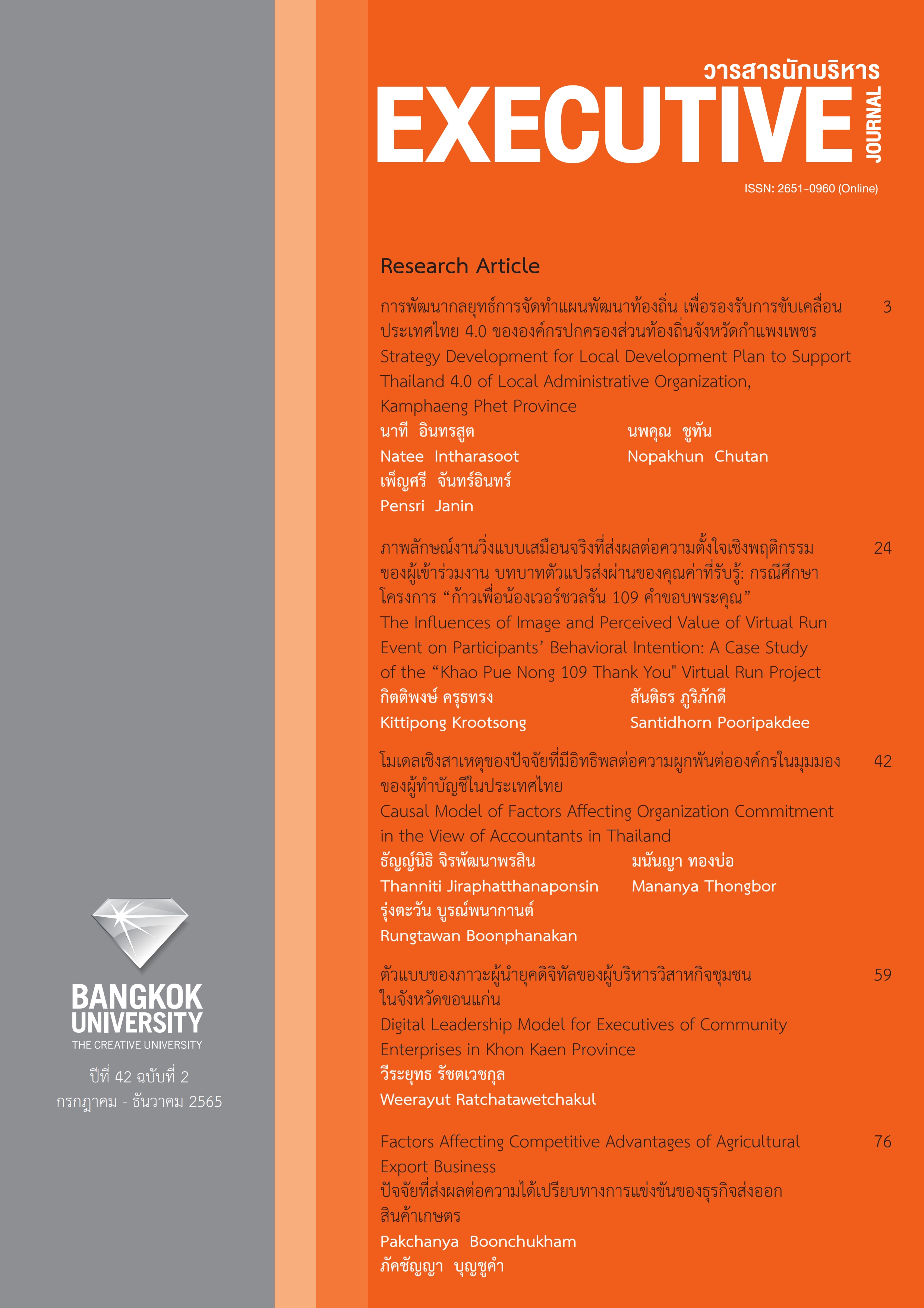Digital Leadership Model for Executives of Community Enterprises in Khon Kaen Province
Main Article Content
Abstract
This research aims to: 1) to test the congruence of the developed digital leadership model for executives of community enterprises in Khon Kaen province based on a certain conceptual framework, related researches and empirical data; 2) to investigate the weight value of digital leadership factors for executives of community enterprises in Khon Kaen province; 3) study development guidelines digital leadership for executives of community enterprises in Khon Kaen province. This research is mixed method. The first phase studied the pattern of leadership in the digital age of community enterprise administrators in Khon Kaen Province. It was a quantitative research which collected data with questionnaires. The sample group was the number of executives of community enterprises in Khon Kaen province consisted of 400 people, and the second phase studied the guidelines for developing leadership in the digital age of community enterprise executives in Khon Kaen Province. This is a qualitative research. By using a semi-structured interview form with 30 experts from all sectors. The statistics used to analyzed the data were frequency, percentage, mean, standard deviation, second-order confirmatory factor analysis and content analysis.
The results are as follows 1) the developed causal model is congruent with empirical data, 2) the major factors had the weight between 0.70-0.98, higher than 0.70, the minor factors between 0.30-0.90 and indicators between 0.40-0.92, higher than the criterion as 0.30. Creativity is the most valuable core element had the weight between 0.98, followed by digital vision had the weight between 0.87, and 3) Guidelines for developing digital leadership. The executives should develop the concept of corporate management to keep up with the modern times. Study and research technology and apply digital tools to manage the organization. as well as taking into account the business ethics for both consumers personnel in the organization society and environment.
Article Details

This work is licensed under a Creative Commons Attribution-NonCommercial-NoDerivatives 4.0 International License.
The manuscript submitted for publication must be the original version, submitted only to this particular journal with no prior acceptance for publication elsewhere in other academic journals. The manuscript must also not violate the copyright issue by means of plagiarism.
References
Accenture. (2020). COVID-19: Building on a trusted platform. Retrieved May 17, 2020, from
Chomphuphan, K. (2021). Nǣothāng kānphatthanā phāwa phū nam chœ̄ng nawattakam nai thurakit yuk dičhithan [Development approach for innovative leadership in digital age businesses]. Journal of Educational Innovation and Research, 5(1), 148-155.
Community Enterprise Registration and Information Group. (2020). Rāingān rāi chư̄ læ čhamnūan samāchik khō̜ng wisāhakit chumchon [Report the list and number of members of the community enterprise]. Retrieved May 27, 2020, from https://smce.doae.go.th/smce1/report/report_smce01.php?page_size=20&PAGE=4177&typeSmce=1&hur=&province=&levelSearch=&startPage=4168&endPage=4177
Hair, J. F., Black, W. C., Babin, B. J., & Anderson, R. E. (2010). Multivariate data analysis (7th ed.). New York: Pearson.
Jitvirat, K. (2018). Mō dē lakān prap tūa khō̜ng ʻongkō̜n thurakit thī dai rap phonkrathop čhāk kāntham lāi lāng khō̜ng theknōlōyī dičhithan nai satawat thī yīsipʻet [Adaptation model of business organizations from the digital disruption impact in the 21st century]. Journal of the Association of Researchers, 23(2), 74-88.
Kaiyawan, Y. (2020). Kān wikhro̜ mōdēn samakān khrōngsāng dūai AMOS [Structural equation model analysis with AMOS]. Bangkok: Chulalongkorn University.
Phonchai, R. (2020). Phāwa phū nam kap kānbō̜rihān nai yuk dičhithan [Leadership and administration in the digital age]. Journal of Humanities and Social Sciences Mahamakut Buddhist University Isan Campus, 1(3), 53-60.
Phothinam, P. (2017). Kānsưksā læ phatthanākān bō̜rihān čhatkān klum wisāhakit chumchon čhangwat Kālasin [The study and development of community enterprise management in Kalasin Province]. Journal of The Way Human Society, 5(1), 191-206.
Sangpho, C., ChanthiwasanKit, S., & Yudiram, S. (2017). Phāwa phū nam nai kānbō̜rihān ʻongkō̜n yuk dičhithan kō̜ranī sưksā: ʻOngkō̜n ʻai thī læ ʻongkō̜n thī kīeokhō̜ng kap ʻai thī nai khēt Krung Thēp Mahā Nakhō̜n læ parimonthon [Leadership in organization management in the digital age case study: It organizations and it-related organizations in Bangkok metropolitan region]. Bangkok: College of Innovation Thammasat University.
Sararatana, W. (2014). Phāwa phū nam: Thritsadī læ nānā thatsana rūamsamai patčhuban [Leadership: Current contemporary theories and views]. Bangkok: Thipwisut.
Sattachatmongkol, N., & Thampaiboon, A. (2016). Phū nam kān plīanplǣng nai yuk lōkāphiwat sū kānphatthanā yāng yangyư̄n [Transformational leadership in globalization towards sustainable development]. Business Review, 8(1), 167-182.
Sheninger, E. (2014). Digital leadership: Changing paradigms for changing times. Thousand Oaks, California: Sage.
Singmat, S., Meemana, P., & Kaewinthorn, D. (2017). Khunnalaksana phāwa phū nam khō̜ng phūbō̜rihān ʻongkō̜n nai satawat thī yīsipʻet [Leadership characteristics of corporate executives in the 21st century]. Maha Sarakham: Rajabhat Maha Sarakham University.
Sukrakarn, C. (n.d.). Phāwa phū nam khō̜ng phūbō̜rihān ʻongkō̜n nai yuk THAILAND 4.0 [Leadership of corporate executives in the era of THAILAND 4.0]. Retrieved May 1, 2020, from
https://spark.adobe.com/page/YlGxuPO3qkdtE/
Tanaboditammachari, D. (2017). Hēt dai čhưng lư̄ak Digital Transformation mā pen nǣokhit nai kāntham Education Transformation nai MonsoonSIM Seminar sō̜ngphansipčhet [Why choose digital transformation? become an idea for education transformation in monsoonsim seminar 2017]. Retrieved April 20, 2022, from http://www.monsoonsimthailand.com/related-topic-to-seminar-theme/-digital-transformation-education-transformation-monsoonsim-seminar-2017
Wiratchai, N. (1999). Mōdēnlitrēn: Sathiti wikhro̜ samrap kānwičhai (Phim khrang thī sām) [Lisrail model: Analytical statistics for research (3th ed.)]. Bangkok: Chulalongkorn University Press.


